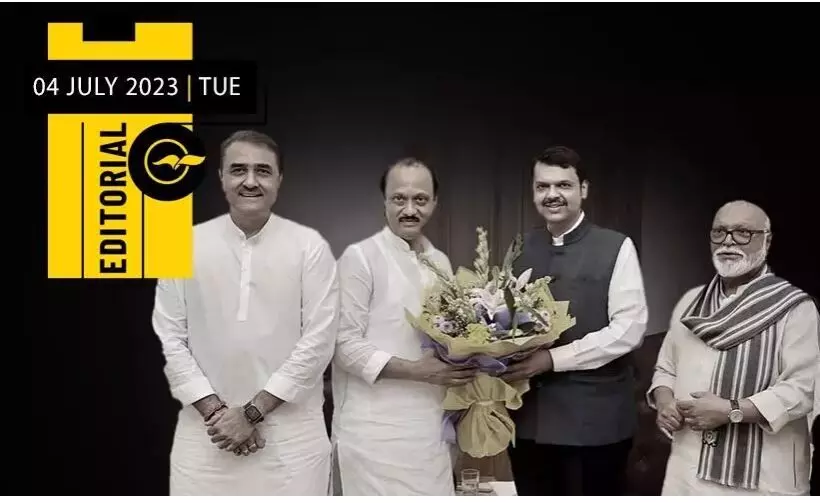
Is this to be called democracy?
text_fieldsIn contemporary democratic India, the overthrowing of governments chosen by the people and the rise of leaders and parties lacking popular consensus have become an alarming trend, referred to as the "new normal." This trend is exemplified by the recent division within the Nationalist Congress Party, a prominent opposition party in Maharashtra, which is known for its frequent political drama. Furthermore, adding to this narrative, the leader of the opposition, who held the position until recently, has now been sworn in as the Deputy Chief Minister.
It is important to note that the results of the elections held in October 2019 for the 288-member assembly in Maharashtra have not been effectively implemented to this day. The Bharatiya Janata Party (BJP) and Shiv Sena contested the elections as an alliance, securing enough seats to form the government. However, a disagreement over power-sharing led to their split. As no party obtained a majority, the state was placed under President's rule. Within a month, Devendra Fadnavis from the BJP was sworn in as the chief minister, with Ajit Pawar from the Nationalist Congress Party (NCP) as the deputy chief minister. Their intention was to split the NCP and strengthen their majority, but this attempt failed, resulting in the government collapsing within four days. Subsequently, the Shiv Sena, NCP, and Congress parties formed a coalition called the Maha Vikas Agadi and established a government, with Uddhav Thackeray from the Shiv Sena assuming the role of Chief Minister. Similarly, Ajit Pawar, who previously served as Deputy Chief Minister under Fadnavis, retained his position in the cabinet under Uddhav's leadership.
The alliance formed by the government was not based on a mandate from the people. Nevertheless, this administration took significant steps towards fulfilling the people's desire for peace and development, emphasizing unity over communalism and hatred. The Shiv Sena-led government actively worked towards fostering harmony among different communities, seemingly as a means of reconciliation for past instances of riots targeting Muslims and South Indians.
However, the central government, recognizing the potential repercussions such a situation could have on its own interests, employed various agencies such as the Enforcement Directorate (ED), Intelligence Bureau (IB), and Narcotics Control Bureau (NCB) to target many individuals associated with the Maharashtra government. Numerous individuals were arrested, while others were subjected to raids and asset seizures, causing significant distress.
Additionally, the governor's conduct seemed focused on orchestrating coups against the state government, rather than fulfilling his role as a coordinator. On June 29, 2022, Eknath Shinde, a member of the Mahavikas Agadi cabinet along with 39 MLAs, split from the Shiv Sena. When the Supreme Court declined to intervene and halt Governor Bhagat Singh Koshiyari's proposal for a trust vote, Uddhav Thackeray resigned from his position. Eknath Shinde assumed the role of Chief Minister, with Devendra Fadnavis becoming the Deputy Chief Minister. After 11 months, the Supreme Court ruled that the governor's action of ordering a trust vote was unconstitutional.
Ajit Pawar and his associates have recently split from the Nationalist Congress Party (NCP) and joined the Bharatiya Janata Party (BJP) at a time when the MLAs who aligned with Eknath Shinde are now at risk of facing disqualification. At present, the prevailing situation indicates that even if Shinde's supporters lose their seats in the legislature, the BJP-led government will likely retain its power. This surprising turn of events occurs at a time when it is widely predicted that the alliance between Shiv Sena, NCP, and Congress will deal a significant blow to the BJP in Maharashtra during the upcoming Municipal, Lok Sabha, and Assembly elections.
Despite his denial, there are accusations suggesting that NCP chief Sharad Pawar, a prominent figure in Maratha politics, may be aware of these developments. While the veracity of such claims remains uncertain, the NCP's decision to create a division serves to cast doubt on the unity and strength of the opposition leadership, which had previously pledged to confront the BJP collectively in the next election. The motivation behind this split cannot be solely attributed to a lust for power. Rather, it stems from the apprehension among NCP leaders, including Praful Patel, Chhagan Bhujbal, and Hasan Mushrif, that the central government, known for its willingness to wield power, is targeting them and their associates. The fear of impending legal action forced these leaders to join forces. Just recently, Prime Minister Narendra Modi delivered several speeches alleging corruption charges amounting to approximately Rs 70,000 crore against NCP leaders. Moreover, during a public event in Bhopal, he declared his intention to initiate investigations against all the accused.
In light of these developments, leaders like Suvendu Adhikari from Bengal, as well as several Shiv Sena and NCP members, have followed the precedent of praising Modi in an attempt to secure immunity from arrests and legal proceedings. Unfortunately, the pain felt by the democratic system, which should serve as a silent witness, seems inconsequential to those involved in these actions.






















